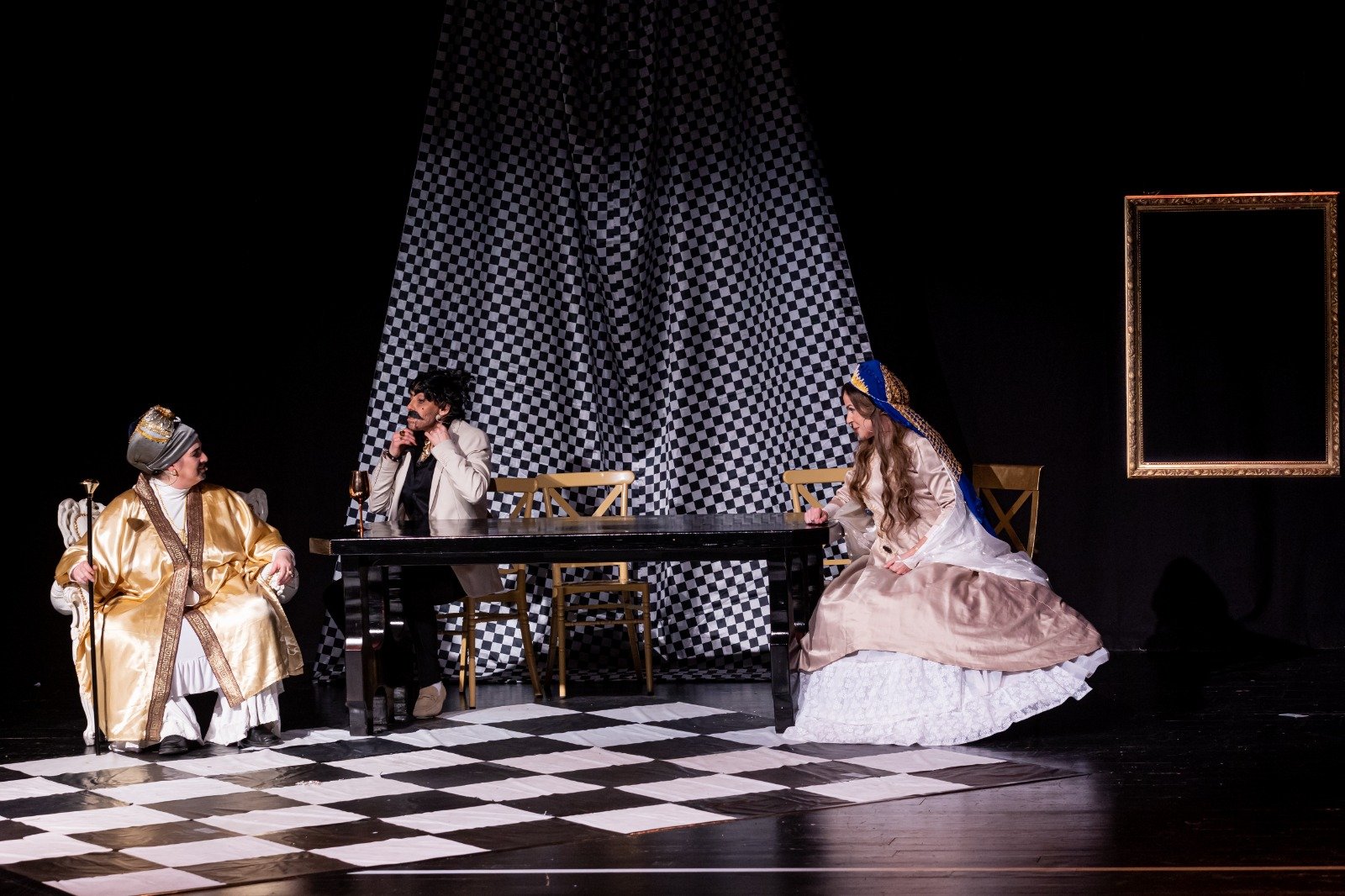Laughter and Unity: How a Comedic Play Brought People Together
Actress and director Ronit Menashe chose to lift spirits with humor amid the country's pain. 'There were fears, but ultimately, we felt a sense of redemption,' she shares.
 Ronit Menashe
Ronit MenasheIt all began nearly a decade ago in Harish. Ronit Menashe, a resident, observed the unfolding events with concern. 'Harish was then just about a street and a half, barely a neighborhood, yet tensions among the residents were already palpable,' she recalls. 'Everyone was pulling in their own direction, attempting to shape the city according to their vision. Hurtful words were exchanged, and distance was felt. What's now happening across the country was there, but in a smaller and more subtle form.'
Ronit couldn't bear the situation any longer: 'There was a difference, and there were conflicts, but the way things were said deeply troubled me. I felt that it couldn't continue this way, believing it was possible to meet each other, understand each other's perspectives, and from that place, engage in respectful dialogue and beneficial actions for everyone.' She decided to use her theatrical talents to create a comedic play about the situation.
'Seeing Life as Scenes'
Ronit's involvement in theater began much earlier. 'I have a degree in design and art and another in logistics and economics, but I haven’t worked a day in either field,' she says with a smile. 'Theater always drew me in, though I never thought I could make it my career, so I chose more practical fields of study.' But pursuing paths not truly hers proved futile. 'My essence and inner self disagreed; my heart craved this.'
How do you start in such a challenging field?
'I started my journey with a friend to support each other. Theater felt so profoundly ingrained in me that life naturally led me to writing and creativity. Naturally, I see life as scenes, recognize conflicts between outward appearances and internal happenings, and seek to stage them. Theater as a whole seeks to explore relationships and understand the psyche, which I aim to bring forth. It's not economically easy, but I believe in listening to my talents and desires, trusting Hashem to bless them. Later, I got to study theater in a program tailored for Haredi women, complemented by Jewish Gestalt studies, which resonated with the deep parts of the soul I wish to present to audiences.'
Through theatrical work, Ronit chose to address the painful relationship issues in her city. 'I felt it needed to be staged, with all the conflicts and pain, but unlike reality—in a way that allows genuine space and listening for all sides. I decided to gather 20 women from all sectors in the city, and we staged "Mess in Shushan," where we made the story of Megillat Esther relevant to today's context and the vital theme of unity. During the creation process, friendships formed among the women, breaking all the ice and hostility. We went through a significant process of clarifying and fine-tuning what we were experiencing, evident on stage. This transformed the atmosphere, making it more attentive and inclusive.'

It’s interesting because, at times, it feels like the secular side doesn’t hear us.
'It exists, but it seems the feeling is sometimes present on the other side too. To me, this should prompt us to question whether we truly listen, how we listen, and how quickly we rush to counter. It allows us to examine where our hearts are in the dialogue, how much we genuinely respect the opposition without trying to change them, despite having a worldview diametrically opposed to ours. A friend who became religious recently expressed, "We sometimes wish to rush the process and bring everyone to repentance already. But look at Hashem—how patient He is with every Jew, how patient He was until I returned to Him." Maybe it’s time to learn from Him—to give everyone space, patiently, and from that respectful place, share our perspective.'
Time passed, but the painful subject resurfaced. 'Harish has now become a real city, a new election cycle arrived, and with it, division touched the residents anew. Again, I found myself wondering how to bring about a change with my tools. Thus, the play "Street Derech Eretz 32" came to life, focusing on the relationships between Haredi, national religious, and secular communities in public spaces. The number 32 is the gematria for "heart," which we sought to awaken. The characters weren’t perfect and had various desires and pains. We chose Haredi, national religious, and secular actresses to depict the real-life conflict and face everything that arises from it. To ease the relationships, the play was comedic and funny, and it was through laughter that authentic truths emerged, connecting more with life.'
Laughing with Hope
Years have passed since, and now there arose a different need. 'Since Simchat Torah, something broke inside us. There's immense pain around, concern for the future,' Ronit describes. 'Since the line-up of holidays starting in Adar, many of us ask ourselves—are we even allowed to be happy? How do we express this joy? Where does it meet us in life? Personally, I felt it couldn’t go on this way, that joy must emerge from hope, from faith in the good. I took our former play, refreshed it for the period, and turned the story of the Scroll into a musical comedy—funny and moving, about our current story. It was joined by diverse contemporary characters like a news anchor from Egypt, Madam Ravia, and more.'
However, Ronit’s heart was restless, and within her, the question kept gnawing—was it right to stage a funny play during such a period? 'I walked with this for a while until a conversation occurred between me and one of the actresses. This friend confided she too was uncertain about it, but her grandmother's story tipped the balance for her. During the Holocaust, her grandmother was a young girl in a camp. Everyone there was in dire physical and mental condition. One day, someone mentioned that the month of Adar was approaching. Of course, no one paid much attention to this statement, seemingly trivial amidst the daily struggle for survival. But the girl, remembering Adar from better days, wasn’t ready to let it go. She persuaded some girls around her to join, collected strings, cardboard, and peels, built a horse for Mordechai the Jew, and on the day itself, put on a short, funny Purim play with her friends. The women watching burst into laughter, an act almost forgotten. It was a significant moment for them, providing strength and hope that one day life's joy would return.'
After hearing the story, Ronit was at peace. 'We had no budget from anyone, but all the actresses joined in, out of a sense of mission that this was the right thing to do. Understanding that we had to add the power of joy to the people and the faith that just like Megillah's story turned for good, so it could for us. This year, the play was performed several times.'
What feeling did you leave the show with?
'The feeling was of redemption, simply redemption. A connection to a more elevated place, full of hope. Someone told me it tied together many loose ends in her mind; other women shared that on Purim when they went to hear the Megillah reading, it was the most moving reading of their lives. The production brought life to both the daily reality and the story of the Scroll.'
Additional reactions to the show came from a different direction. 'Quite a few women wrote to us saying it reconnected them with an old dream, a passion they abandoned long ago. Not necessarily the stage, but a desire to do what they love. Seeing women connected to their talents and bringing them to the world encourages a desire to connect to that place too. I once attended a class by Rabbanit Yemima Mizrachi, and she said a phrase that has stuck with me since: 'Whoever gives up on her dream, the dream gives up on her.' Most of us are mothers managing households and value presence at home, but sometimes amidst life's burdens, we give up on our additional endeavors and walk around feeling something's missing within. In contrast, connecting with one's inner desire and deciding to fulfill it, even on a small scale, brings amazing vitality that influences other areas of life.'
Like the play, the need to laugh emerged again after the war. 'We have a playback theater, and we hesitated to perform after Simchat Torah. But requests poured in, mostly from the south. Here too—women had faced difficult experiences, all wanting to share them. Processing them through laughter made it easier. Those whose spouses were called up, holding their home and work alone, mothers with enlisted sons, daughters celebrating at their grandmother's in Netivot during the holiday, and many more, came, opened their hearts, and expressed their struggles through laughter.'
The important tool of theater touched an especially painful experience. 'A mother whose daughter was murdered at Nova approached me to create a play in her memory. This was a woman who, even before the murder, gave talks, and now—with time passing—felt she needed something else. She told me, "I feel it’s what I want, but I don’t know why. I already give a talk to people, so why a play?"
Why indeed a play?
'Because this concept brings emotion, and when we undergo an emotional experience, its memory is retained in our body's cells. It goes beyond merely discussing matters; it engraves deep experiences within us, and with the power of this experience, we bring redemption.'

